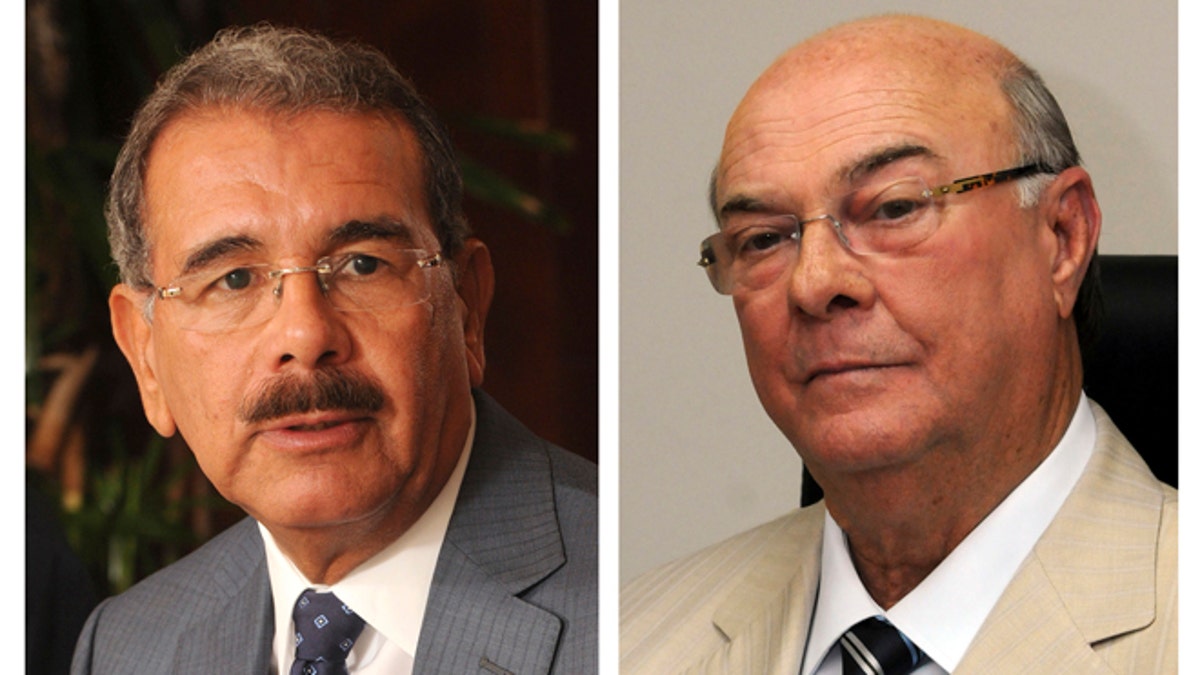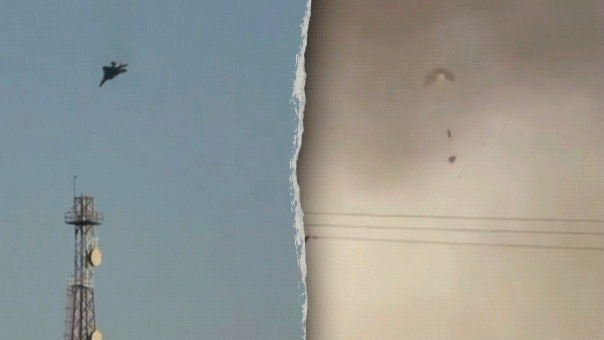
In this combo of two photographs, Danilo Medina, left, is a presidential candidate of the ruling Dominican Liberation Party. Hipolito Mejia, right, is a former president and candidate of the opposition Dominican Revolutionary Party. (AP Photo/Manuel Diaz) (AP2012)
SANTO DOMINGO, Dominican Republic – The Dominican Republic will vote for a president on Sunday in a decision likely to come down to whether Dominicans are more frustrated with the current government, or more fearful of what might happen under a former president whose single term ended with the deepest economic crisis in the modern history of the country.
After eight years under President Leonel Fernández of the Dominican Liberation Party, or PLD, Dominicans will decide whether they are ready to give former President Hipólito Mejía, a gaffe-prone populist, another chance in office. Mejía's four-year presidential term ended in disaster, with a banking crisis that sunk the economy and caused so much misery and scarcity that tens of thousands of people fled the country and voters cast him out of office.
The question is whether they are more tired of the current government or more fearful of what might happen under Mejia.
The alternative for Dominicans is Danilo Medina, an old rival who last faced Mejía in 2000 and lost decidedly to him.
The pair face off again in Sunday's election and several polls show ruling party-candidate Medina could win with slightly more than 50 percent of the vote, thus avoiding a runoff.
The question now is whether enough time has gone by for crucial swing voters to give Mejía another chance, said Rosario Espinal, director of the Latin American Studies Center at Temple University in Philadelphia.
"The country is not in a crisis like it was in 2003 and 2004. It's a very different situation," said Espinal. "But there is a lot of disenchantment with the government, especially with the high cost of living."
Espinal, a leading political analyst of the country, said the election will turn on the narrow slice of the electorate who are not affiliated with either the PLD or Mejía's opposition Dominican Revolutionary Party.
"The question is whether they are more tired of the current government or more fearful of what might happen under Mejía," she said.
Fernández is not running for a third consecutive term. Medina, 60, is a party stalwart who has promised to improve upon but not make any major changes to the policies of the outgoing president, who has embarked on a massive public works campaign that included a subway system modeled after the one in New York.
Ramona Hernández, director of the Dominican Studies Institute of the City University of New York, said it will be in part a generational struggle between those who remember the crisis, which was set off by the failure of three banks and resulted in a nearly 20 percent drop in GDP, and those who never lived through it.
"People between 40 and 60 years old, they haven't forgotten. He has a history," Hernández said of Mejía. "But he has a chance with younger people."
In addition to president, Dominicans are electing a vice president from a field that includes the heavily favored First Lady, Margarita Cedeño de Fernández, and seven members of the Chamber of Deputies who will represent people who have settled overseas. Tens of thousands are expected to cast ballots in places with large numbers of Dominicans, including New York, New Jersey, Florida and Puerto Rico.
Politics in the Dominican Republic, which shares the island of Hispaniola with Haiti, largely revolves around the PLD and Mejía's Dominican Revolutionary Party, or PRD. Both were founded as Marxist parties by Juan Bosch, president for a year in 1963 until he was ousted in a coup. The two have come to embrace free trade, generally pro-business policies and close ties to the U.S. The PLD is considered "center right," largely because it's in power, and the PRD is said to be center-left but the differences largely turn on personality, loyalty and patronage.
The presence of the first lady is something of a wild card. Martha Jímenez, a 29-year-old who sells lottery tickets, said she has always supported the PRD but this year she will support the Dominican Liberation Party of Cedeño because the first lady helped her sister, who was badly burned in an accident, get a skin transplant.
"I don't know how to thank her. She has given us so much," Jímenez said.
Both presidential candidates have proposed to increase spending on education and to do what they can to create jobs in a country of 10 million people that is largely dependent on tourism and where unemployment is officially about 14 percent, though the vast majority of workers are in the poorly paid informal sector. The typical salary for those who do have regular jobs is around $260 per month.
The Dominican Republic has also become an important route for drug smugglers seeking to reach the U.S. through nearby Puerto Rico and there are widespread concerns about the influence of drug trafficking. They have also traded accusations of incompetence and corruption.
Medina is a technocrat who has spent much of his life in politics.
"I'm no fan of Danilo (Medina). He's kind of dull," said Miguel Pichardo, a 27-year-old taxi driver. "But I'm going to vote for him because I don't want Hipólito to come back."
Mejía, a 71-year-old who refers to himself as "Papa" and styles himself as a man of the people, has also enlivened the campaign with some of the verbal missteps for which he has long been famous. Most recently, he joked that house maids are prone to steal meat from the houses where they work so they can give it to their boyfriends, not a wise comment in a country where more than half the population works in the informal section, many of them as maids.
Mejía "talks a lot of nonsense," said Maria Altagracia Ramírez, a 26-year-old maid. "How could I vote for him? That man is crazy."
Reporting by the Associated Press.
Follow us on twitter.com/foxnewslatino
Like us at facebook.com/foxnewslatino












































